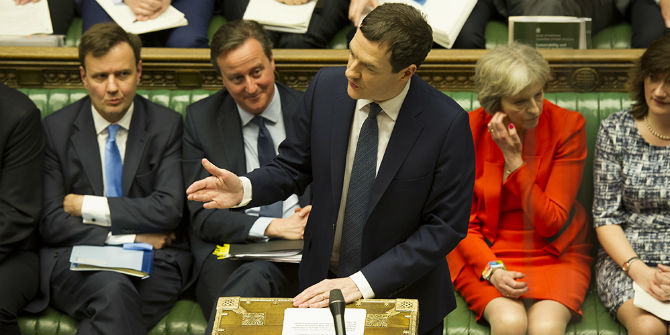In its first session, last Friday, the LSE Commission on the Future of Britain in Europe deliberated on “EU Financial Integration & Protection for Eurozone “Outs”. A good part of the conversation was spent on whether the British financial sector is very distinctive and hence incompatible with its continental counterparts, or whether it is precisely its size and domestic prominence that necessitates stronger ties with the rest of the EU. Waltraud Schelkle, the convenor of the hearing, argues that since the UK has chosen to be an international financial centre, it is in Britain’s vital national interest to stay in the EU, because it needs to influence its decisions about financial regulation.
Is UK finance so distinctive that the government must either seek renegotiation of EU financial regulation or consider leaving the EU? At the first hearing of the LSE Commission on the future of Britain in Europe, a lively discussion arose on whether the sector’s sheer size makes the present middle of the road policy — in the EU but not in the euro area — accident-prone. The great British taxpayer, so the argument goes, has implicitly underwritten the liabilities of its vast banking sector. This includes foreign subsidiaries should the banks run into problems. EU financial market integration attracts banks to reside in the UK. However, in the case of another circus, they may need euro liquidity that the Bank of England cannot provide and thus are at risk of going bust.
David Cameron’s response to this issue is to pull up the drawbridge.
In his letter to Council President Tusk on 10 November 2015, also known as the “Dear Donald letter”, the PM proposes: “Taxpayers in non-Euro countries should never be financially liable for operations to support the Eurozone as a currency”. Why did then the (coalition) government support the bailout program for the Republic of Ireland in December 2010, to the tune of €3.8bn? Is the Dear Donald letter announcing that a purely Tory government would never again help the euro area? Perhaps, back in 2010, there was insight on the part of the Treasury that this was a small price to pay. The bailout for Ireland, which amounted to €85bn, or 43% of Ireland’s 2007 GDP, was also a bailout for the British banks. They had a total exposure to the Irish economy of around €172bn at the end of 2010 ($224.6b at the 1 December 2010 exchange rate), exceeding that of German banks (with the next biggest exposure) and US banks (far less exposed) (Bank for International Settlements 2011).
 The Square Mile. Photo: Michael Garnett under a Flickr Creative Commons licence.
The Square Mile. Photo: Michael Garnett under a Flickr Creative Commons licence.
Some participants of the hearing disagreed with the too-big-to-stay argument outlined above. First of all, the UK’s position is not unique, quite a few EU countries have oversized banking systems: Ireland is one of them, Cyprus and above all Luxembourg are others. Moreover, the UK is actually in a better position than most. Because of its important role in central clearing of euro-denominated derivatives, the Bank of England and the European Central Bank have formal swap arrangements that give the UK access to euro liquidity. If access is ensured, there is much less risk of a liquidity crisis turning into insolvency. It is not obvious how leaving the EU would make the too-big-for-its-own-good syndrome of UK finance any easier to handle.
So how big is UK finance?
The first thing to remember is that banks are of course only a share of the whole. Data from 2006 shows that banking (“monetary financial institutions” in BoE terminology) accounted for about 55% of income generated by the sector. Insurance and pension funds made up another 20%, the rest came from other financial intermediaries like leasing firms and auxiliary services such as advisors and fund management (Bank of England’s Quarterly Review of 2011 Q3, Table 1). The income generated (gross value added) in the financial sector was a bit less than 8% of GDP before the crisis and has risen to 8% in 2014. The sector employs less than 4% of the UK workforce — obviously a well-paid workforce (or more flatteringly: it has high labour productivity). The assets of this financial sector amounted to about 800% of GDP in 2014 – this stunning figure includes insurers and pension funds but excludes derivatives (Bank of England 2015, chart 1.10).
What role does the EU play in all this?
The EU is a continent of small, open and rich economies. Hence, more than two-thirds of global cross-border investment involves the EU. The Bank of England (2015, 9) calculated that in 2013-14, two thirds of international portfolio investment (worth in total £28tn), two thirds of cross-border banking (total £21tn) and a whopping three quarters of all foreign direct investment (FDI, total £17tn) were intra-EU or went into the EU or came from the EU. The UK has a big share in all of this. Take FDI: 46% of all FDIs into the UK comes from other EU members, compared to 27% from the United States and equally from the rest of the world; 43% of all UK direct investment abroad goes to the EU, while only 23% goes to the United States and 34% to the rest of the world.
In Europe, it is only UK’s banking sector that is more international than European.
Only 16% of UK banking assets are owned by European banks which includes those outside the EU, such as Swiss or Norwegian banks (members of the European Economic Area). This contrasts with 30% of assets owned by banks outside Europe. The rest, more than half, of UK banking assets are owned by domestic banks. Of the 250 foreign banks operating in the UK, only 80 are European (Bank of England 2015, 27). Therefore, if the implicit underwriting of bank assets by the UK taxpayer, is a threat to the economy, then the UK must consider leaving not just the EU but … the world economy.
Or is it all just about London and not about the UK?
Actually, no. About half of all income in the financial and insurance sector is generated in London, the rest is spread out across the UK (Tyler 2015, table 2). About two thirds of the 1.1m jobs in the financial sector are outside London. The upshot to this is that the UK, not just the City and Canary Wharf, has chosen to be an international financial centre. This situation renders staying in the EU in the UK’s vital national interest because the EU is itself a big player in cross-border financial services and a standard-setter for others. As long as UK policymakers want the country to be an international financial centre, they should want to be in the room when decisions about financial regulation are taken. UK finance is too big to leave.
This article represents the views of the author and not those of the BrexitVote blog, nor the LSE.
 Waltraud Schelkle – LSE, European Institute
Waltraud Schelkle – LSE, European Institute
Waltraud Schelkle is Associate Professor of Political Economy at the European Institute of the LSE. She is presently working on a book about “The political economy of monetary solidarity: understanding the experiment of the euro” (under contract with OUP).






